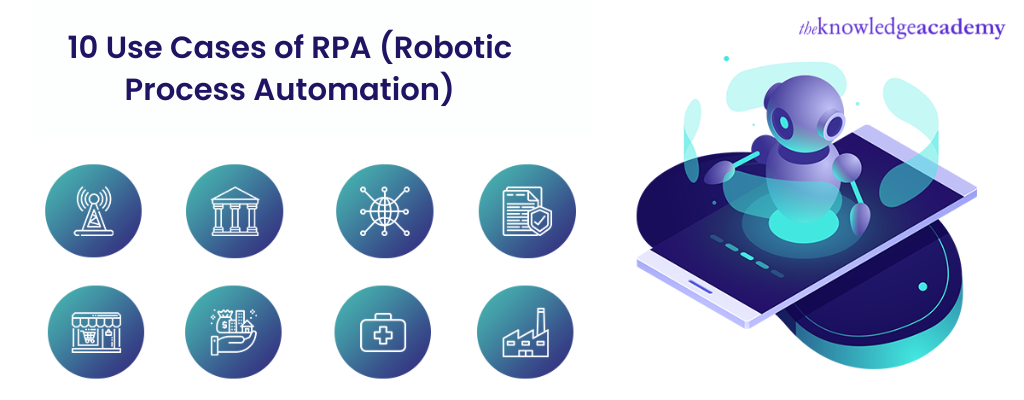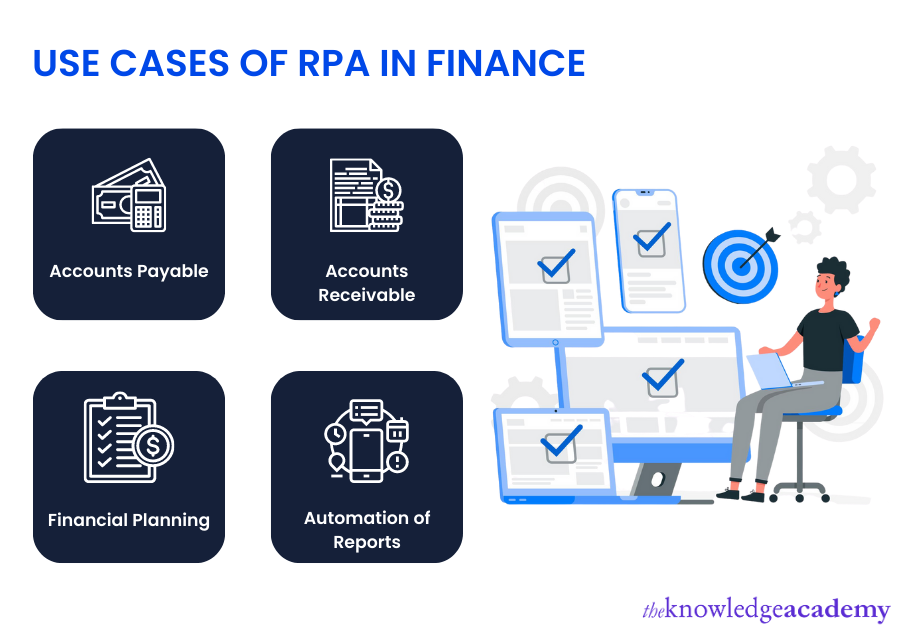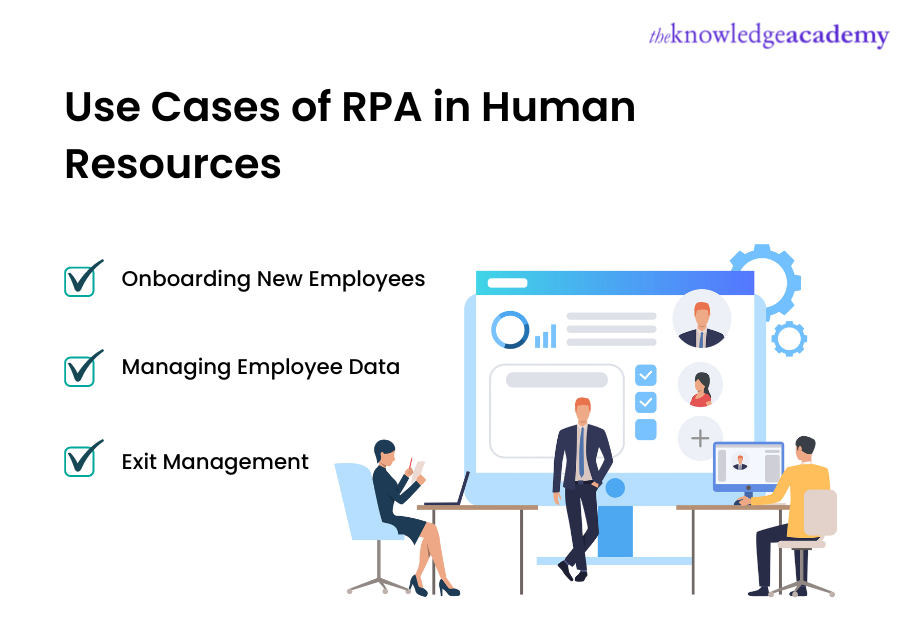We may not have the course you’re looking for. If you enquire or give us a call on 01344203999 and speak to our training experts, we may still be able to help with your training requirements.
Training Outcomes Within Your Budget!
We ensure quality, budget-alignment, and timely delivery by our expert instructors.

Robotic Process Automation (RPA) is widely used across industries today. RPA is a cost-effective technological solution which increases productivity and efficiency, resulting in the company's overall growth. RPA Use Cases show the various ways industries can use RPA.
RPA is most commonly used in sectors of finance, banking, retail, etc. RPA helps simplify common business processes and save money for industries of all sizes. According to the joint research by KPMG Global Advisory and HFS Research, 81% of the companies invest in RPA. Check out the top 10 Use Cases of RPA (Robotic Process Automation). Learn how it is organised, making access to all kinds of business information easy.
Table of Contents
1) Use Cases of RPA in Retail
2) Use Cases of RPA in Banking
3) Use Cases of RPA in Healthcare
4) Use Cases of RPA in Finance
5) Use Cases of RPA in Information Technology
6) Use Cases of RPA in Telecommunications
7) Use Cases of RPA in Customer Care
8) Use Cases of RPA in Insurance
9) Use Cases of RPA in Property Management
10) Use Cases of RPA in Human Resources
11) Conclusion
Learn about the different techniques involved in automation by signing up for our Robotic Process Automation using UiPath course now!
Use Cases of RPA in Retail
Multiple tasks in retail can be automated for maximum efficiency. Store planning, inventory management, consumer behaviour analysis, and customer support management are a few of those tasks. Some of the RPA Use Cases in the Retail industry are:
Inventory Management
Understocking and overstocking are the two prime reasons for a weak inventory. Inventory control systems powered by RPA will always monitor the stock levels and offer information about it in advance. RPA also supports the prevention of data duplication and dead-stock tracking.
Sales Analytics
Accurate sales analysis can provide valuable data to improve the company’s performance. RPA can help obtain important insights into store performance, customer preferences, and customer churn rate, which can help companies turn profits. A huge reduction in human efforts is one of the benefits of using RPA here.
Marketing
Automating data flow and interaction between CRMs and marketing platforms are a few ways RPA can boost targeted market campaigns. RPA is useful in automating retail promotional activities as well.
Use Cases of RPA in Banking
RPA is widely used in banks to take over repetitive processes like data entry, customer information storage, and customer service. They are preferred in the banking industry because it helps save money and eliminates the margin for human error.
One of the Use Cases in Banking is Loan Processing and Validation. The process of Loan Processing involves a couple of elaborate steps. Performing this task manually takes a lot of time. But with RPA, the processing time can come down to 10-15 minutes from 40 minutes. RPA also helps increase the accuracy and speed of storing and organising data.
Card management is another concern for banks. Tasks centred around card management include replacing stolen/lost cards, billing processes, and even card-blocking decisions. Such tasks of repetitive nature can be taken over by RPA, thereby reducing the workload on employees and saving time.
Use Cases of RPA in Healthcare
In the Healthcare sector, the accuracy of data and patient care are the fundamental tasks that require the most attention. RPA can be used to automate data entry freeing time for employees, which gives them more time to focus on their patients, guaranteeing maximum efficiency from all sides.
With improved patient record management, RPA can help design and track healthcare plans or health objectives based on the patient’s choices. This keeps the designated doctors in the loop with their patients, and what would otherwise be an expensive alternative is replaced with a cost-effective RPA.
Another Use Case to mention is the analysis of large amounts of data in a short period. Sometimes, Doctors need to go through years of medical history to propose a diagnosis. But, with RPA, huge data chunks can be analysed quickly, and the results can be used to give accurate diagnoses and treatment.
Improve your understanding of ROS Architecture and learn to debug ROS nodes. Sign up for our Robot Framework Training course now!
Use Cases of RPA in Finance

One of the biggest examples of using RPA in Finance is the Royal Bank of Canada. The Royal Bank of Canada is the largest financial institution in Canada that has been using smart chatbots to improve customer service. Some of the RPA Use Cases in Finance include:
Accounts Payable (AP) and Accounts Receivable (AR)
AP and AR fall under accounting tasks that include many repetitive steps. These include managing outgoing and incoming documents, which contain many sub-tasks. Automation of these tasks can help save time and money.
Financial Planning
The process of Financial Planning involves two steps - Forecasting and comparing results with plans. Providing accurate forecasts involves researching the market to understand the latest financial trends. The forecast is then compared with the actual results to determine the company's vulnerabilities.
Financial Planning aims to present valuable data about the company’s performance to stakeholders. Carrying out all these tasks will put immense pressure on the employees. RPA Bots can help make accurate forecasts quickly and offer insights on financial statements, investments, and more.
Automation of Reports
Gathering data for reports and creating them is a tedious and repetitive task in organisations. RPA plays a cardinal role in automating these reporting processes, and they can deliver quick results with a greater accuracy rate.
Tasks like generating reports and collecting business data can be automated for increased efficiency. One of the prime examples regarding automation of report generation is Deloitte. They availed the service of a couple of RPA bots which helped bring the report generation time from a week to mere minutes.
Use Cases of RPA in Information Technology
Activities like employee onboarding and data transfers are just a few of the responsibilities of the workers in the IT sector. Mind-numbing tasks that include staring at a screen for hours on end can now be halted with RPA.
Data Transfers are heavy and time-consuming in large organisations, and RPA Bots can automate this process and save administration time. Another tedious task is processing payrolls, and RPA tools can calculate an employee’s pay and handle bank transactions.
Any good organisation would prioritise customer care, and one step in guaranteeing this would be considering all customer complaints and suggestions. Storing and organising this data can prove to be a hassle. But, with RPA, these tasks can be streamlined and finished quickly.
Use Cases of RPA in Telecommunications
Telecommunication industry is flooded with repetitive operational processes. When these tasks aren’t completed quickly and accurately, it hinders the company's growth. RPA software can help them by taking off a considerable workload from the employees. Here are some of the RPA Use Cases in Telecom:
Processing Manual Sales Orders
RPA software is equipped to grasp employees' entire workflow while manually processing sales orders. They then mimic these actions and provide favourable results. Additionally, telecom companies can determine which steps are to be automated to ensure maximum efficiency and productivity. They do so by comparing each step with the cost of its manual labour.
Network Management
In a digitally connected world, it is only natural for network traffic to peak. Telecom companies sometimes find it difficult to manage networks with such busy networks. Navigating applications and retrieving vast amounts of customer-related information are some tasks that make network management difficult. RPA software offers automated solutions for repetitive tasks, which frees up time for network engineers to focus on other complex areas.
Expense Control
Effective management of funds is always a priority for organisations. RPA tools can help track expenses, bring down capital expenditures, offer automated reports, and manage software and hardware costs. Tasks like billing and revenue management can also be automated.
Learn to develop open-span solutions, projects, and more by signing up for our OpenSpan RPA Training course now!
Use Cases of RPA in Customer Care
![]()
As the attention span of humans decreases daily, the anticipation for quick responses is high. Automated customer care systems can quickly clear up customer doubts and sort the issues into different categories. Here are some of the Use Cases of RPA in customer service:
Helping Customer Representative Agents
Handling customer complaints and suggestions can be a tedious task. Customers expect their agents to know every detail about their purchases, transactions, and interests while communicating. Researching an entire client history and tracking orders are time-consuming tasks.
RPA Bots can help resolve this issue by quickly running through huge amounts of data and automating order tracking. It presents its findings in advance, which customer service representatives can use.
Manage Refunds
RPA software can access all previous transactions and refund inquiries from various sources like emails and texts. It uses this information to carry out refund processes, causing a considerable depreciation of human effort.
Reporting Customer Complaints
RPA Bots are used to make the process of reporting customer complaints easier. They can use Natural Language Processing (NLP) and Optical Character Recognition (OCR) to identify and extract the complaints and store and organise the data in spreadsheets. The reports generated with the data can be sent to customer support employees or used to detect issues.
Apart from this, AI-enabled RPA is used to solve other issues. It can use NLP to understand the intent of customer emails and then direct them to designated customer service reps.
Use Cases of RPA in Insurance
The Insurance industry is one where the dependency on technology always remains high. With new technologies popping up daily, the scope for digitisation increases considerably. However, progress is hindered due to certain factors like saturated legacy systems and complex business models. RPA software automates multiple tasks resulting in improved efficiency. Here are some of the Use Cases of RPA in Insurance:
Claims Processing
Claims Processing is a time-consuming process. It consists of a long process of data collection from multiple channels and processing them on time, which usually demands high manual labour. RPA software can help process claims 75% faster.
NLP and OCR can be used to claim errors and verify fraud claims, among other things. RPA maintains accuracy and increases the speed at which claims are processed. The elimination of manual labour reduces the margin of error too.
Business Analytics
Multiple processes are going on at any time in an insurance company. The long list of responsibilities makes it hard for employees to keep track of factors like company efficiency and vulnerabilities.
RPA bots help to tackle this issue. They carry out time-consuming tasks and keep track of progress. They also help in regulatory compliance, which is an integral responsibility of any insurance company.
Sales and Distribution
The processes under Sales and Distribution are highly repetitive and involve the creation of different records like sales and funnel records. Insurance agents are supposed to monitor the process's legal, credit, and other aspects.
RPA helps ease this process by providing a variety of solutions. It can automate legal and credit checks and check compliance, among other tasks. With increased productivity and efficiency, customer satisfaction rates can also boost.
Use Cases of RPA in Property Management
The Real Estate and Property Management industry demands a lot of data processing, document management, accounting, and more. Additionally, employees need to check compliance with the multiple rules and laws that factor in.
The RPA software has brought down the workload in the Real Estate industry. Almost 70-80% of processes with rules conditioned to them can be automated. When RPA takes care of such data-intensive work, it frees up employees’ time and lets them focus on other areas. Here are some of the Use Cases of RPA in Property Management:
Tenant Onboarding
More than the property itself, Real Estate is an industry that also relies on trust and connections. Providing tenants with a smooth onboarding experience is crucial, and the weight of the data-heavy and time-consuming tasks must not affect the tenants’ decisions or choice of property.
RPA bots help streamline these tasks as they can be programmed to handle tasks based on rules. They can help create new tenant applications, verify identification and employment, and even run background checks to check for criminal history.
Reminding Payments
Reminding people about their rent payments every month is a highly tiresome and repetitive task. RPA software helps in the automation of rent payment reminders. The bots are conditioned to send out reminder emails or texts and are also responsible for verifying the information of payees.
Managing Portfolios
In Real Estate and Property Management, optimising portfolios means selling off the least ranked properties and purchasing the ones with high demand or the ability to grow. This allows companies to obtain the best properties, thereby increasing their value.
RPA software helps list properties sold out/rented and updates this information on various sites to increase visibility. Using RPA allows Real Estate agents to forget the administrative part and focus on their potential tenants.
Use Cases of RPA in Human Resources

The arena of Human Resources (HR) is undoubtedly one that always drowns in paperwork or heavy data. RPA helps in bringing down the repetitive and tedious work of HR Professionals. Here are some of the Use Cases for RPA in Human Resources:
Onboarding New Employees
Selecting new employees in organisations is always a hassle for HR professionals. From shortlisting resumes to assigning company emails to new hires, these are intensive tasks carried out via many steps.
RPA bots are of great help as they can look through multiple resumes and application forms simultaneously. They can be programmed to check for certain qualities that can make someone a potential employee at the company.
They can also be programmed to send out offer letters to selected candidates. This includes gathering information about all candidates from various sources, drafting the letter, and sending it to the designated emails.
Managing Employee Data
HR professionals must keep track of their existing or current employees’ data. Multiple folders might hold data about various aspects of the employee, like their personal information, payroll information, and more. RPA Bots help maintain data compatibility in various systems and eliminate the margin for error.
Exit Management
The exit experience of employees is as important as providing a smooth onboarding experience. HR professionals are burdened with various processes related to Exit Management. These tasks usually produce errors and take up a lot of time. RPA can be used to prepare all necessary documents needed for off-boarding. They can automate exit surveys, collect company assets, and even process final payments.
Conclusion
RPA Use Cases are instrumental in understanding the uses and advantages of RPA in various industries. More and more industries are opening up to the idea of adopting RPA to improve company efficiency and employee productivity. We hope this blog has helped you learn about the top 10 Use Cases of RPA and how it benefits organisations.
Understand the basics of RPA to build your first Blue Prism Process. Sign up for our Blue Prism Training course now!
Frequently Asked Questions
Upcoming Business Analysis Resources Batches & Dates
Date
 Robotic Process Automation using UiPath
Robotic Process Automation using UiPath
Thu 9th May 2024
Thu 27th Jun 2024
Thu 18th Jul 2024
Thu 12th Sep 2024
Thu 7th Nov 2024
Thu 12th Dec 2024







 Top Rated Course
Top Rated Course



 If you wish to make any changes to your course, please
If you wish to make any changes to your course, please


